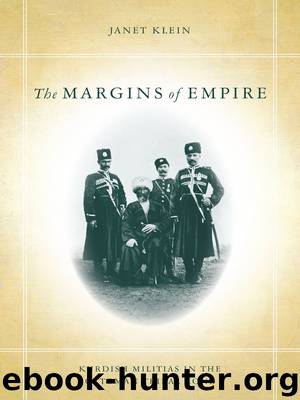The Margins of Empire by Klein Janet

Author:Klein, Janet
Language: eng
Format: epub
Publisher: Stanford University Press
Published: 2011-03-15T16:00:00+00:00
THE “AGRARIAN QUESTION,” 1908–1914
Immediately after the reinstatement of the second Ottoman constitution in 1908, Armenian political and community leaders pushed for the return of the Armenian lands that had been usurped by Kurdish tribal chiefs over the previous two to three decades. They now had a name for their cause—“the agrarian question.” While Armenian leaders had many reforms they wished to urge on the new regime, the “agrarian question” was perhaps the most important. Indeed, several observers believed that it had been a key issue drawing Armenians to become revolutionaries in the first place. Even before “the agrarian question” as such surfaced, it was reported: “Armenians are gradually being ousted from their villages, and their lands are falling into the hands of Kurds”—a point stressed by the revolutionaries.116 By 1908, then, when the “agrarian question” became a clear-cut grievance, the Dashnakists, for example, had numerous complaints and demands they wished to be addressed, but most of their pleas were for the immediate arrest and punishment of those aghas who had taken Armenian lands.117 In the months following the proclamation of the constitution, Armenian peasants, also emboldened by the initial positive measures taken by the new regime, pushed harder for the return of usurped lands and the resolution of the “agrarian question.” In the new climate of peace in August and September, hundreds of protests were made by Armenians in hopes of getting back their lands that had been seized.118 The government immediately began to make inquiries, and followed up by issuing orders for the return of these lands and, in some cases, the arrest of the usurpers. Hüseyin Pasha became an instant target for the policy, but he was only one of many ordered to give back their illicitly obtained territories.
The new regime began at once energetically to address this matter that was so important to its Armenian constituents as well as to European onlookers. Almost immediately, orders began to emanate from the capital for the eviction of Kurdish chiefs from the Armenian villages in which they had illegally settled. However, the matter would become quite complicated for all of the parties involved. Just as the process of land-grabbing had been closely associated with the Hamidiye and the license accorded to its members by its patrons, so would the “agrarian question” remain intimately linked with the question of the Hamidiye and its role under the new regime. Moreover, by extension the “agrarian question” necessarily became connected to the larger matter of the state’s relationship with the Kurdish aghas who had grown so powerful during the Hamidian period.
Hayderanî Hüseyin Pasha, as we have seen, built what I have referred to as a “new tribal emirate” through his Hamidiye connections, which allowed him to expand his zone of influence and ownership. As one of the chief usurpers of Armenian lands, his name naturally figured prominently in the various exchanges on the “agrarian question” beginning in 1908. Indeed, he was one of the first land-grabbers to be sought by the new regime in connection with such activities.
Download
This site does not store any files on its server. We only index and link to content provided by other sites. Please contact the content providers to delete copyright contents if any and email us, we'll remove relevant links or contents immediately.
| African-American Studies | Asian American Studies |
| Disabled | Ethnic Studies |
| Hispanic American Studies | LGBT |
| Minority Studies | Native American Studies |
Cecilia; Or, Memoirs of an Heiress — Volume 1 by Fanny Burney(32558)
The Great Music City by Andrea Baker(32019)
Cecilia; Or, Memoirs of an Heiress — Volume 2 by Fanny Burney(31956)
Cecilia; Or, Memoirs of an Heiress — Volume 3 by Fanny Burney(31942)
We're Going to Need More Wine by Gabrielle Union(19046)
All the Missing Girls by Megan Miranda(16028)
Pimp by Iceberg Slim(14507)
For the Love of Europe by Rick Steves(14121)
Bombshells: Glamour Girls of a Lifetime by Sullivan Steve(14075)
Talking to Strangers by Malcolm Gladwell(13370)
Norse Mythology by Gaiman Neil(13365)
Fifty Shades Freed by E L James(13241)
Mindhunter: Inside the FBI's Elite Serial Crime Unit by John E. Douglas & Mark Olshaker(9343)
Crazy Rich Asians by Kevin Kwan(9292)
The Lost Art of Listening by Michael P. Nichols(7506)
Enlightenment Now: The Case for Reason, Science, Humanism, and Progress by Steven Pinker(7313)
The Four Agreements by Don Miguel Ruiz(6765)
Bad Blood by John Carreyrou(6621)
Weapons of Math Destruction by Cathy O'Neil(6280)
